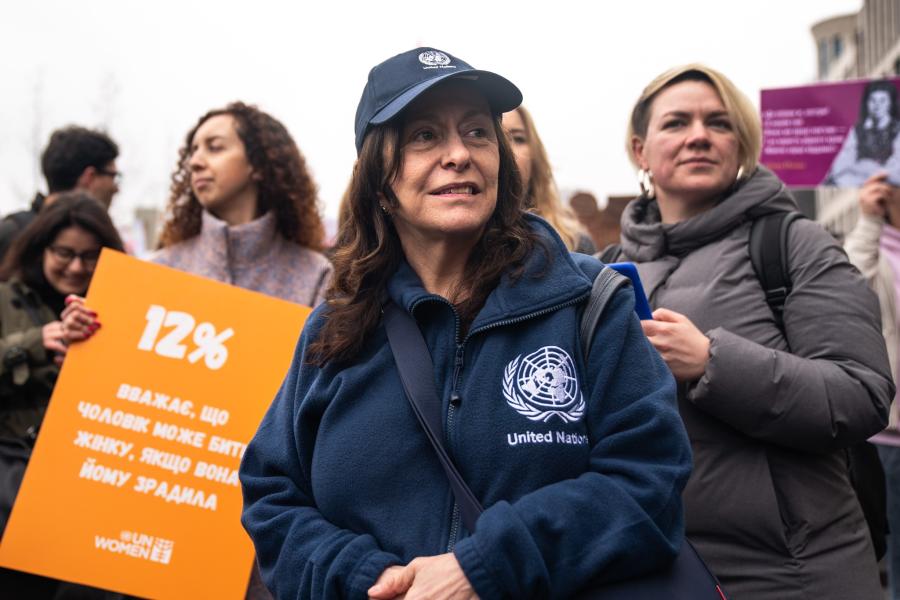Statement on occasion of 2021 International Women’s Day by Osnat Lubrani, UN Resident and Humanitarian Coordinator in Ukraine
08 March 2021
- This year’s International Women’s Day comes amidst a devastating pandemic that is affecting the entire world, including all Ukrainians. In the words of the UN Secretary-General this is “a crisis with a women’s face”.

COVID-19 has adversely impacted women and deepened gender gaps, whether because women make 80% of front line health workers, or due to the unprecedented heavy increase in burden of care with schools and kindergartens shut for long stretch of time, but also because of the soaring rise in domestic violence associated with pressures, both economic and psycho-social. Considering that prior to COVID-19 there were significant disparities in indicators measuring women’s economic activity, employment, wages, or pensions, compared to men, it not surprising that the economic downturn caused by the pandemic brings disproportionate severe hardship to women.
It is fitting that the theme for the 2021 International Women’s Day is leadership. To shape a resilient, more equal future and recovery from the COVID-19 pandemic, the kind of leadership we need is one in which women are represented equally in all spheres where decisions are taken, so that they are empowered, equally with men, to fully realize their human rights in all spheres of life, including economic, social, cultural, civil, and political rights.
The increased representation of women in Parliament and Government of Ukraine to 20% since the last parliamentary elections is an improvement. However, there are still no women among heads of regional state administrations. In terms of participation in the economy, there are significantly fewer women in higher earning management positions. Women in Ukraine do not reach 30% of owners in any segment of business – micro, small, medium, and large.
Women are mainly employed in the public sector, like health care, social welfare, and education, where salaries are generally lower. At the local level women are better represented, particularly at community level they make up to 50% in local councils or in village councils, up to 54%. It is in these lower ranking, lower paying, less visible, yet highly demanding and responsible positions that I have been inspired by the power of Ukrainian women’s leadership. I have been privileged to meet women whose lives are dedicated to caring for their communities. On this International Women’s Day, I salute these women who are champions for what I believe transformational leadership is all about: from the director of the school who is passionate and creative in finding solutions to help disadvantaged children from the Roma community, the social workers, directors of centers for IDPs, shelters for homeless, older persons, or survivors of violence, to directors of hospitals offering palliative care for patients with chronic diseases, heads of kindergartens and schools in conflict-affected settings where access to even basic services remains a challenge and humanitarian needs are acute, department heads in municipalities responsible for social services, heads of community centers, cultural centers, libraries.
Today let us make visible the leadership of countless women who devote their lives with empathy and selfless dedication - not for the pay or the glory - but for their human centered belief in the cause of keeping communities cohesive and resilient in the face of any and all adversities - from insufficient budgets, to unrelenting challenges of conflict, now surmounted by COVID-19. Let us commit today to lifting, emulating, and scaling up their kind of transformational leadership to the highest levels.
The UN in Ukraine welcomes the national efforts to systematically address existing gender inequality, including inequalities in the labour market. Increasing participation of women in the labour market and ensuring their leadership at all levels in all sectors, would translate into an accelerator of progress across all SDGs. Ukraine’s European aspirations alongside Agenda 2030 are powerful guides to bringing more equality and justice into all walks of life, including the productive life which takes at least half of a human lifetime. We need bold decisive action across the world to bring women into the heart of the decision-making spaces in large numbers and as full partners, so that we can make immediate progress on a sustainable, equitable and inclusive world.





